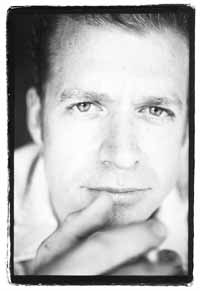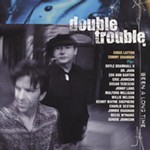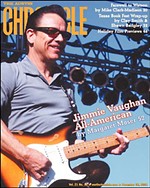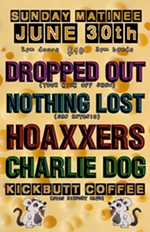Life of the Party
By Andy Langer, Fri., Oct. 2, 1998
|
|
Now, two years later, it appears that Robison is either a slow learner or that he may have genuine reason for his renewed enthusiasm. His new album, Life of the Party, is in record stores nationwide thanks to Lucky Dog, an upstart Sony Nashville imprint dedicated to progressive country, an artist-friendly major in an almost indie-style setting. Better yet, Robison is an obvious priority for the label; so far, Lucky Dog has showcased him at Sony's annual convention and landed reviews in USA Today and People.
In fact, only a month after its release, Life of the Party has already broken into the Americana Top 10, while the album's first commercial country single, "Barlight," hits radio next month -- preceded a week by a video on CMT and appearances on several of the channel's interview shows. That list of early accomplishments is why Robison is once again so excited, he says, adding that he's only buying the hype because it feels so little like hype.
"I genuinely believe everyone at Sony is into it not because there's $1 million on the line -- because there's not -- but because every now and then they get something going through there they actually like," explains Robison. "And it's cool, because it's stuff they take home to listen to rather than just show up to work to pitch. It's wonderful to talk to people because they like the record, not just because they've been assigned to me."
While in-house enthusiasm from one's label would seem an obvious prerequisite for stardom, Life of the Party wouldn't be nearly as exciting if it weren't for its obvious commercial potential. By design, Robison and co-producer Lloyd Maines struck a balance between the local singer-songwriter's country roots and the marketplace's constant demands for slick Nashville-style anthems.
But while the bulk of Life of the Party may still prove a bit too rock & roll for country (and vice versa), "Barlight," a honky-tonk nursery rhyme that's been the Continental Club's in-house anthem for years, still reeks of a country radio can't-miss. It's the kind of catchy, no-nonsense fun country radio's been lacking of late. In fact, all the song seems to be missing is some shameless hat act willing to have it whored out as the next "Achy Breaky Heart."
"I would think some hat act willing to jump through all the hoops might indeed have an easier time getting it played," admits Robison. "'Barlight" was one of the first songs I ever wrote and it's the song that haunts me. I hope this is the last time I record that song. The pop and country commercial sensibilities of that song are too strong to leave alone. There's actually been a lot of people that have come close to cutting that song. And to tell you the truth, I really wanted that. I wanted to be known as the guy who wrote that song and still performed it, not the guy who did it. But now we got a good recording and video. Once and for all, 'Barlight' is going to be put to bed, one way or another. It will either do well or won't."
Whether "Barlight" actually breaks at country radio or not, Robison says that just having it shoved through the Music Row pipeline by a company as large as Sony is more than a guy from Bandera, Texas has a right to expect.
"At that Sony convention last July, my brother [Bruce Robison, who also records for Lucky Dog] and I sat on the main stage, where Gloria Estefan, the Black Crowes, and all these other folks had just played with these huge bands, and we just had two stools and two acoustic guitars," recounts Robison. "There was a minute where the curtains were closed and we were sitting in the dark listening to them introduce us. In a second, our faces were going to be on these giant monitors where if we'd looked up we'd have seen our noses five stories high.
"And it was one of those moments. Here were these two kids from Bandera who'd worn the worst holy clothes growing up about to play for every Sony employee. For a guy that feels like he has rope for a belt every time he walks into the Sony building in Manhattan, it was amazing -- very overwhelming."
Obviously, it was not the first time the Robison brothers had shared a stage. In fact, Charlie Robison actually started out playing in his younger brother's high school garage band back in Bandera -- as the drummer. Although that garage band went on to play the regular regional circuit of rodeos, dancehalls, and parties, Charlie opted out after he accepted a football scholarship to Southwest Texas State.
Three years and several knee injuries later, Robison followed his brother to Dallas, where Bruce was playing basketball for Trinity Valley Junior College. The elder Robison bought a couple of guitars, practiced a few months, and convinced his brother to abandon basketball and head to Austin.
After living like the "Joad musical family" for six months, Robison met Ricky Broussard at a late-night party and agreed to join Two Hoot & a Holler, which held down the Monday and Friday night slots at the Black Cat. Before long, Robison also picked up regular Wednesday and Saturday Black Cat gigs with Chaparral, the popular local country outfit with a rotating lineup that later included both Robisons. After leaving both bands to start the Millionaire Playboys, Robison ultimately decided to gamble on a solo career.
"The songs I was writing for Two Hoots and Chaparral made it into the sets, but weren't very good," admits Robison. "And then one day I figured out how to write in a different way. I can't remember what day it happened, but it happened on a day where I started writing stream-of-consciousness, exactly how I felt, rather than writing towards the melody or the hookline.
"It dawned on me that it didn't have to rhyme or be a play on words -- as long as it was something that was direct and that happened. Being so honest about your family life and failed relationships felt like a weird place to go, but all of a sudden, it was, 'Wow! I'm writing songs now.'"
In 1994, the best of those songs were released as Bandera, an indie album Robison recorded with Lloyd Maines. The record not only sold well to Robison's small but loyal Continental Club following, it also got the attention of the Warner Bros. brass in Los Angeles, who then passed it on to the label's Nashville office.
By early 1996, Robison had signed a development deal with Warner Bros. Nashville and within three months Robison's demos had produced a record deal. The label then hired producer Josh Leo (Alabama, Nitty Gritty Dirt Band) to keep Robison in line musically, something he failed to do with the recording budget, which ballooned to nearly $200,000 for just eight songs.
"Throughout the process, the only people that had really heard the record was A&R," explains Robison. "And apparently, A&R is a little more liberal about things. The whole time, they were trying to pitch me outside songs. And I said, 'Look, I told you, I don't really do outside songs. I do a couple of Bruce's and that's it.'"
With just two songs left to record, the label sent the finished tracks to its promotions department to make sure "all the ducks were in row" and "everyone was on the same page." By the end of the year, Robison found out not everyone was.
"They called up out of the blue one day and said, 'Promotions got it and they don't get it. They say you need more outside songs and commercial stuff and you said you don't want to do that. If that's still the case, we don't have anything more to talk about.' It was just like that, on an answering machine message.
"I played it back thinking it was a joke. It wasn't. And in retrospect, it would have been better to have brought promotions in six months earlier and save Charlie a year of his life."
Even though Robison calls the period after being dropped "the worst time of my life," he admits he never really felt comfortable at Warner Bros. in the first place.
"The whole time I was at the label, I wished I was off," he says. "I didn't get along with the people all that well and just didn't feel comfortable. But the rejection was worse. And now, as passé as it sounds, the worst thing in your life turns out to be the best. It put me in a situation where I had a more laid-back attitude. Once you realize the label deal isn't the end-all, you don't spend as much time worrying."
After preliminary discussions with a handful of major and several prominent indies, Robison chose Lucky Dog, which was being headed by one of Robison's old drinking buddies and confidantes, Blake Chancy. The label had already signed Bruce Robison and had plans to release live albums from Asleep at the Wheel and David Allan Coe. Better yet, all Lucky Dog asked was that Robison deliver one or two songs that could fit country radio. In return, he would get a video budget the indies couldn't offer and the hands-on decision-making potential the majors wouldn't offer.
"I know there's a chance it's not going to work, but I'm very excited and there's no way not to be," enthuses Robison. "The difference is now I'm working a record I got to write, pick all the songs, and co-produce. And the people I'm around I'd hang around with whether I was making a record for them or not. I'm actually having fun. And if you told me if I was going to have fun working with a major label, I'd tell you you were crazy."
Does that mean Robison is not ready for all the attendant headaches that go along with promoting a major-label album?
"My dream career would be to have the size career somebody like Steve Earle has," says Robison. "To just draw 1,000 people regularly like Jerry Jeff or Ray Benson. To me, that's the perfect career. And I've always enjoyed flying below the radar anyway. I never dressed well enough or schmoozed well enough to be the flavor of the month.
"But I'm learning how to make enough friends to where they'll let you make your own records and get it out there. To come down to Ray Benson's studio, use all my friends, have Sony put it out, and get it reviewed in all these places is amazing. It's cool right now. Let's just hope it keeps working."









